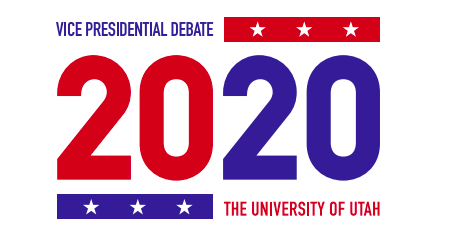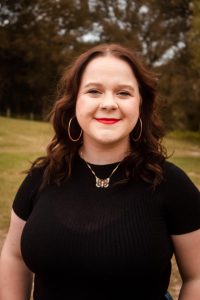Administration Plans Opportunities to Include Students in the Vice Presidential Debate Across the U’s Campus

Vice presidential debate logo. (Courtesy of vice presidential debate style guide).
August 18, 2020
As the University of Utah plans to host the vice presidential debate, which will feature Mike Pence and Kamala Harris, planners are incorporating the debate into different lessons and classes on campus and calling on student volunteers to help run the events.
While 120-150 students will be chosen via lottery to be present in Kingsbury Hall to watch the debate, around 150 students will serve as greeters, receptionists, runners, computer technicians, parking attendants and media assistants. Students can apply to volunteer online and will be chosen by Aug. 31
“This is a once-in-a-lifetime for our University of Utah students. A major debate like this has never been held in Salt Lake City or the state of Utah before. We hope that all students in the state recognize this opportunity to engage in the political process in any way possible,” said Shawn Wood, community liaison and communications specialist at the U, in an email.
All Utah K-12 and U students will also be able to enter an essay contest to answer the question, “If you could ask the vice presidential candidates one question, what would you ask and why?”
After each district evaluates the essays, they will be sent to the Utah Debate Commission to determine the winning essays for each grade. The winning essays will be published in both the Salt Lake Tribune and Deseret News and also have the chance to be asked in the debate.
The Utah Debate Commission has also worked with the Utah State Board and business partners to create curriculums and lesson plans for K-12 students.
“Teachers can use these resources to incorporate the debate into their classes however they see fit. The essay contest is an extension of that program to engage students in the electoral process and to learn what issues are important to students across the state. It is hoped there will be submissions from all 41 districts in the state and universities and colleges,” Wood said.
In addition to being physically present at the debate, students can also take classes that have incorporated programming centering on the debate and relevant political issues this election cycle.
Each week in the community health issues class taught by Jessica King, students will learn and debate health topics relevant to the election such as gun control, abortion, universal healthcare, etc.
Another class, mathematical modeling will “use mathematical models to develop questions and evaluate answers relevant to the COVID-19 pandemic.”
Other specific class programming can be found on the U’s website.
The specific class sections were submitted by teachers and professors who started making plans in April to incorporate the debate into their class.
“From the submissions and estimated students in each course … over 2,000 U students will be engaged in the debate through the classroom this fall,” Wood said.
Melissa Regalado, a senior studying political science, said having a debate on the U’s campus is a great experience and opportunity to be civically engaged.
“I think being able to volunteer for an event where you’re actually able to see these candidates that might represent us in the future is definitely significant,” Regalado said. “I think [the essay contest] will make students feel not only more represented but also feel like they’re a part of something much bigger that’s actually going to affect them.”







